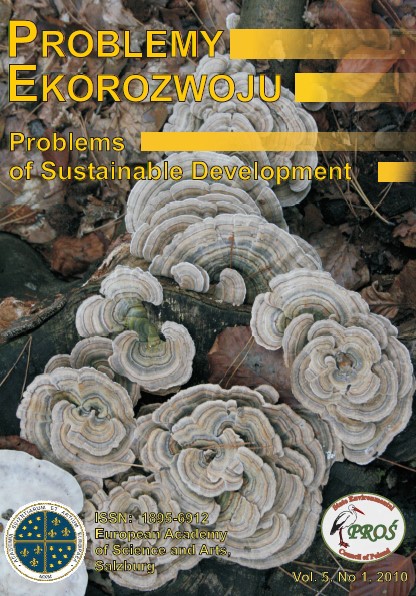Book Review: L. Gawor, Szkice o cywilizacji, 2009
Article Sidebar
Issue Vol. 5 No. 1 (2010)
-
Humanitarian Motives for Sustainable Developments in a Global Economy: An Essay
Paul T. Durbin9-13
-
A Curmudgeon’s Thoughts on Sustainability
David L. Russell15-22
-
Human Progress Towards Equitable Sustainable Development: A Philosophical Exploration
Victor Udo, Artur Pawłowski23-44
-
A Multifunctional Mosaic of Green Spaces in the Context of the Lower Silesia Region (Southern Poland) Sustainable Development
Anna Zaręba45-51
-
Model of Permanent Eco-chemical Education of Employees of Chemical Industry in the Function of Ecological Development
Stanko Cvjetićanin, Mirjana Segedinac, Jasna Adamov53-58
-
Decade of Education for Sustainable Development – Polish Challenges
Tadeusz Borys59-70
-
Some of the Theoretical Sustainable Development Aspects in the Reflection of the Christian Middle Ages Philosophy
Krzysztof Bochenek71-79
-
Polish and German Experiences in Planning and Implementation of Sustainable Development
Aleksandra Kuzior81-89
-
Biodiversity Conservation as One of Necessary Conditions of Ecodevelopment
Andrzej Urbisz91-94
-
Transformation of Cultural Landscapes in the Light of the Idea of Sustainable Development
Urszula Myga-Piątek95-108
-
A Cybernetic Approach to Sacrum – Profanum Relation
Lesław Michnowski109-138
-
Problems of Evaluation of Sound and Smell Discomfort in Sustainable Development
Sebastian Bernat139-144
-
Book Review: W. Sztumski, Quo ruis homo? Środowisko życia, czas, ludzie, 2008
Ignacy S. Fiut145-148
-
Book Review: L. Gawor, Szkice o cywilizacji, 2009
Jacek Lejman145-151
-
Letter to the Editorial Office: Sustainable Economy Based on Knowledge
Bazyli Poskrobko153-154
-
Communiques on Activities of the State Environmental Council of Poland
Tomasz Winnicki157-166
Archives
-
Vol. 7 No. 2
2012-07-02 14
-
Vol. 7 No. 1
2012-01-02 12
-
Vol. 6 No. 2
2011-07-01 19
-
Vol. 6 No. 1
2011-01-03 18
-
Vol. 5 No. 2
2010-07-01 21
-
Vol. 5 No. 1
2010-01-04 16
-
Vol. 4 No. 2
2009-07-01 19
-
Vol. 4 No. 1
2009-01-05 22
-
Vol. 3 No. 2
2008-07-01 19
-
Vol. 3 No. 1
2008-01-02 12
Main Article Content
Authors
Abstract
As the title already indicates, and as the author writes in the introduction, these sketches can be read in two ways: firstly, as a whole, aimed at proving a certain, otherwise, original thesis (or rather, a set of at least two theses), or autonomously, as simply a set of articles about civilizational concepts of several more or less known authors. In the latter sense, repetitions (referencing) in subsequent chapters to things described in earlier chapters become understandable. However, despite this inconvenience, the first way of receiving the text is definitely more interesting.
In the presented model, its two components are important. Firstly, a comparison of the humanistic tendencies and ideals of the Enlightenment with the modern ones by juxtaposing the concept of rational humanity (Human Reason) with the project of a rational ecological and political rescue of the modern world. In this way, pluralistic civilizational concepts seem to be only an important, but still, episode in the history of striving for a “civilization of one great humanity”. Secondly, which appears to be extremely original, the author of Szkicy… sees the program framework of this new project not in the IT breakthrough of the global village, not in the economic and social fact of creating a civilization of the world of the globalized market, but in the idea of sustainable development, which until now could rather be regarded as one component of this larger whole.
Keywords:
Article Details
Abstract views: 75
License

This work is licensed under a Creative Commons Attribution-ShareAlike 4.0 International License.


